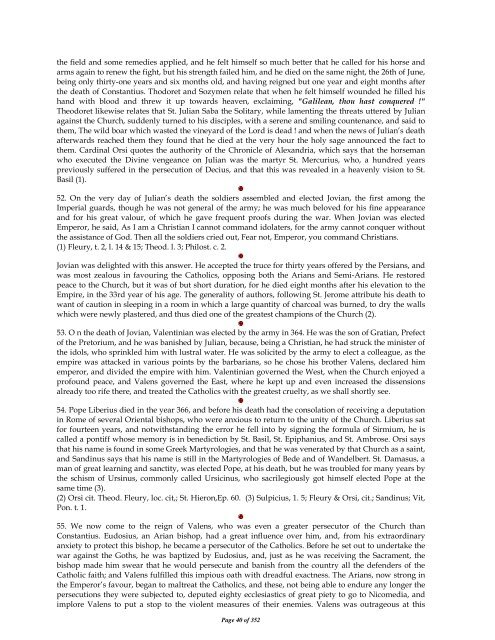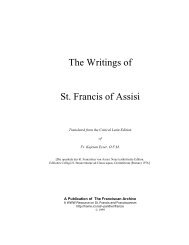the history of heresies, and their refutation - Catholic Apologetics ...
the history of heresies, and their refutation - Catholic Apologetics ...
the history of heresies, and their refutation - Catholic Apologetics ...
You also want an ePaper? Increase the reach of your titles
YUMPU automatically turns print PDFs into web optimized ePapers that Google loves.
<strong>the</strong> field <strong>and</strong> some remedies applied, <strong>and</strong> he felt himself so much better that he called for his horse <strong>and</strong><br />
arms again to renew <strong>the</strong> fight, but his strength failed him, <strong>and</strong> he died on <strong>the</strong> same night, <strong>the</strong> 26th <strong>of</strong> June,<br />
being only thirty-one years <strong>and</strong> six months old, <strong>and</strong> having reigned but one year <strong>and</strong> eight months after<br />
<strong>the</strong> death <strong>of</strong> Constantius. Thodoret <strong>and</strong> Sozymen relate that when he felt himself wounded he filled his<br />
h<strong>and</strong> with blood <strong>and</strong> threw it up towards heaven, exclaiming, "Galilean, thou hast conquered !"<br />
Theodoret likewise relates that St. Julian Saba <strong>the</strong> Solitary, while lamenting <strong>the</strong> threats uttered by Julian<br />
against <strong>the</strong> Church, suddenly turned to his disciples, with a serene <strong>and</strong> smiling countenance, <strong>and</strong> said to<br />
<strong>the</strong>m, The wild boar which wasted <strong>the</strong> vineyard <strong>of</strong> <strong>the</strong> Lord is dead ! <strong>and</strong> when <strong>the</strong> news <strong>of</strong> Julian’s death<br />
afterwards reached <strong>the</strong>m <strong>the</strong>y found that he died at <strong>the</strong> very hour <strong>the</strong> holy sage announced <strong>the</strong> fact to<br />
<strong>the</strong>m. Cardinal Orsi quotes <strong>the</strong> authority <strong>of</strong> <strong>the</strong> Chronicle <strong>of</strong> Alex<strong>and</strong>ria, which says that <strong>the</strong> horseman<br />
who executed <strong>the</strong> Divine vengeance on Julian was <strong>the</strong> martyr St. Mercurius, who, a hundred years<br />
previously suffered in <strong>the</strong> persecution <strong>of</strong> Decius, <strong>and</strong> that this was revealed in a heavenly vision to St.<br />
Basil (1).<br />
<br />
52. On <strong>the</strong> very day <strong>of</strong> Julian’s death <strong>the</strong> soldiers assembled <strong>and</strong> elected Jovian, <strong>the</strong> first among <strong>the</strong><br />
Imperial guards, though he was not general <strong>of</strong> <strong>the</strong> army; he was much beloved for his fine appearance<br />
<strong>and</strong> for his great valour, <strong>of</strong> which he gave frequent pro<strong>of</strong>s during <strong>the</strong> war. When Jovian was elected<br />
Emperor, he said, As I am a Christian I cannot comm<strong>and</strong> idolaters, for <strong>the</strong> army cannot conquer without<br />
<strong>the</strong> assistance <strong>of</strong> God. Then all <strong>the</strong> soldiers cried out, Fear not, Emperor, you comm<strong>and</strong> Christians.<br />
(1) Fleury, t. 2, l. 14 & 15; Theod. l. 3; Philost. c. 2.<br />
<br />
Jovian was delighted with this answer. He accepted <strong>the</strong> truce for thirty years <strong>of</strong>fered by <strong>the</strong> Persians, <strong>and</strong><br />
was most zealous in favouring <strong>the</strong> <strong>Catholic</strong>s, opposing both <strong>the</strong> Arians <strong>and</strong> Semi-Arians. He restored<br />
peace to <strong>the</strong> Church, but it was <strong>of</strong> but short duration, for he died eight months after his elevation to <strong>the</strong><br />
Empire, in <strong>the</strong> 33rd year <strong>of</strong> his age. The generality <strong>of</strong> authors, following St. Jerome attribute his death to<br />
want <strong>of</strong> caution in sleeping in a room in which a large quantity <strong>of</strong> charcoal was burned, to dry <strong>the</strong> walls<br />
which were newly plastered, <strong>and</strong> thus died one <strong>of</strong> <strong>the</strong> greatest champions <strong>of</strong> <strong>the</strong> Church (2).<br />
<br />
53. O n <strong>the</strong> death <strong>of</strong> Jovian, Valentinian was elected by <strong>the</strong> army in 364. He was <strong>the</strong> son <strong>of</strong> Gratian, Prefect<br />
<strong>of</strong> <strong>the</strong> Pretorium, <strong>and</strong> he was banished by Julian, because, being a Christian, he had struck <strong>the</strong> minister <strong>of</strong><br />
<strong>the</strong> idols, who sprinkled him with lustral water. He was solicited by <strong>the</strong> army to elect a colleague, as <strong>the</strong><br />
empire was attacked in various points by <strong>the</strong> barbarians, so he chose his bro<strong>the</strong>r Valens, declared him<br />
emperor, <strong>and</strong> divided <strong>the</strong> empire with him. Valentinian governed <strong>the</strong> West, when <strong>the</strong> Church enjoyed a<br />
pr<strong>of</strong>ound peace, <strong>and</strong> Valens governed <strong>the</strong> East, where he kept up <strong>and</strong> even increased <strong>the</strong> dissensions<br />
already too rife <strong>the</strong>re, <strong>and</strong> treated <strong>the</strong> <strong>Catholic</strong>s with <strong>the</strong> greatest cruelty, as we shall shortly see.<br />
<br />
54. Pope Liberius died in <strong>the</strong> year 366, <strong>and</strong> before his death had <strong>the</strong> consolation <strong>of</strong> receiving a deputation<br />
in Rome <strong>of</strong> several Oriental bishops, who were anxious to return to <strong>the</strong> unity <strong>of</strong> <strong>the</strong> Church. Liberius sat<br />
for fourteen years, <strong>and</strong> notwithst<strong>and</strong>ing <strong>the</strong> error he fell into by signing <strong>the</strong> formula <strong>of</strong> Sirmium, he is<br />
called a pontiff whose memory is in benediction by St. Basil, St. Epiphanius, <strong>and</strong> St. Ambrose. Orsi says<br />
that his name is found in some Greek Martyrologies, <strong>and</strong> that he was venerated by that Church as a saint,<br />
<strong>and</strong> S<strong>and</strong>inus says that his name is still in <strong>the</strong> Martyrologies <strong>of</strong> Bede <strong>and</strong> <strong>of</strong> W<strong>and</strong>elbert. St. Damasus, a<br />
man <strong>of</strong> great learning <strong>and</strong> sanctity, was elected Pope, at his death, but he was troubled for many years by<br />
<strong>the</strong> schism <strong>of</strong> Ursinus, commonly called Ursicinus, who sacrilegiously got himself elected Pope at <strong>the</strong><br />
same time (3).<br />
(2) Orsi cit. Theod. Fleury, loc. cit,; St. Hieron,Ep. 60. (3) Sulpicius, 1. 5; Fleury & Orsi, cit.; S<strong>and</strong>inus; Vit,<br />
Pon. t. 1.<br />
<br />
55. We now come to <strong>the</strong> reign <strong>of</strong> Valens, who was even a greater persecutor <strong>of</strong> <strong>the</strong> Church than<br />
Constantius. Eudosius, an Arian bishop, had a great influence over him, <strong>and</strong>, from his extraordinary<br />
anxiety to protect this bishop, he became a persecutor <strong>of</strong> <strong>the</strong> <strong>Catholic</strong>s. Before he set out to undertake <strong>the</strong><br />
war against <strong>the</strong> Goths, he was baptized by Eudosius, <strong>and</strong>, just as he was receiving <strong>the</strong> Sacrament, <strong>the</strong><br />
bishop made him swear that he would persecute <strong>and</strong> banish from <strong>the</strong> country all <strong>the</strong> defenders <strong>of</strong> <strong>the</strong><br />
<strong>Catholic</strong> faith; <strong>and</strong> Valens fulfilled this impious oath with dreadful exactness. The Arians, now strong in<br />
<strong>the</strong> Emperor’s favour, began to maltreat <strong>the</strong> <strong>Catholic</strong>s, <strong>and</strong> <strong>the</strong>se, not being able to endure any longer <strong>the</strong><br />
persecutions <strong>the</strong>y were subjected to, deputed eighty ecclesiastics <strong>of</strong> great piety to go to Nicomedia, <strong>and</strong><br />
implore Valens to put a stop to <strong>the</strong> violent measures <strong>of</strong> <strong>the</strong>ir enemies. Valens was outrageous at this<br />
Page 40 <strong>of</strong> 352













